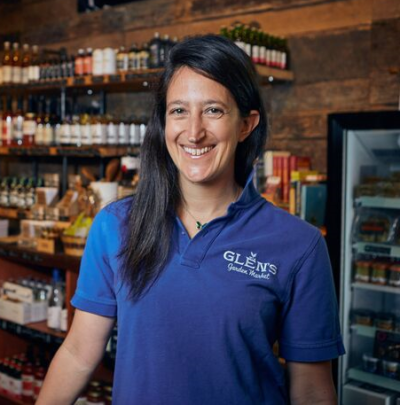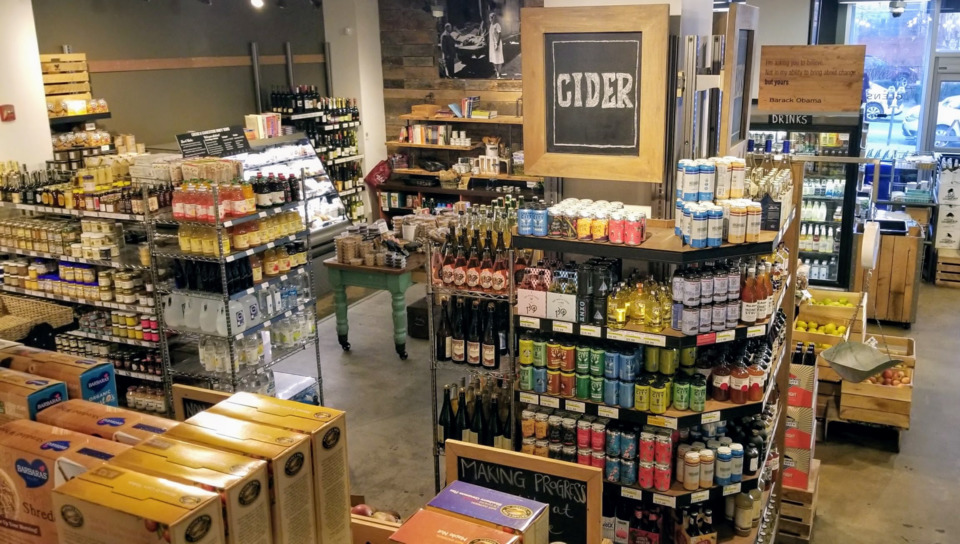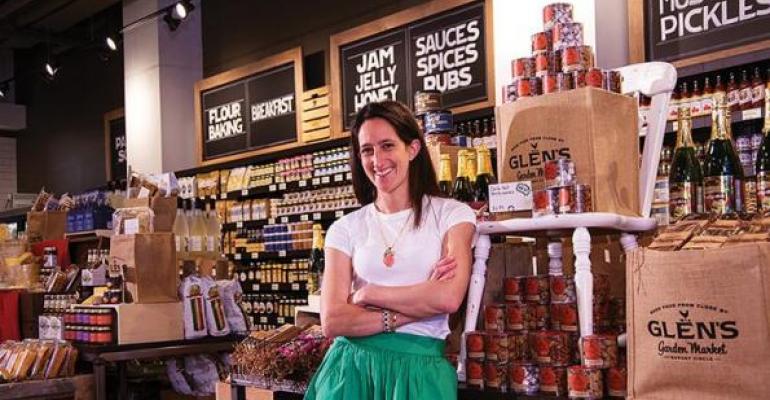Glen’s Garden Market is an activated community center: the antidote to Amazon. Their Founder & CEO, Danielle Vogel, shares her inspiring story, passion for climate change and what she looks for when investing in entrepreneurs.

Danielle Vogel comes from a long line of grocers, stretching back four generations. Before founding Glen’s Garden Market, Danielle worked in government for 10 years as a policy adviser and litigator. When the effort to pass comprehensive climate legislation failed, she dedicated herself to finding a new, more incremental, way to address global warming: engaging her community in the Good Food movement.
1. Tell us your story. What made you decide to quit your stable job on the Hill to open Glen’s?
I spent a decade on Capitol Hill, working for Democrats, Republicans and Joe Lieberman to pass comprehensive climate legislation. In the middle of all of that, I worked at the Department of Justice as an environmental litigator, enforcing the Clean Air Act. When it became clear that the prognosis for legislative progress on climate change was bleak, I had to find a way to continue making progress…without Congress.
On Earth Day of 2013, I opened the doors to Glen’s Garden Market for the explicit purpose of making incremental climate change progress. Every single decision we make for the business is made with the environment in mind: we’re 100% solar-powered, produce no food waste, offer only reusable bags at checkout and source mainly within the states of the Chesapeake Bay Watershed. Parading around as a pretty little grocery store, we’re actually very intentional change agent.
2. You’ve been able to build such a captive audience and strong following with Glen’s. Was creating community and connection intentional? What do you think has been your “recipe for success”?
We invest in our team and our community in several meaningful ways.
- Local producers: Nearly everything in our store was grown or created within states of the Chesapeake Bay Watershed. The result is a highly curated product mix that showcases the very best of our region, while minimizing transportation and refrigeration emissions.
- Incubation & Capital: In just over six years, we’ve launched 89 local, small businesses, giving them their first chance to sell their products in the store. Of those companies, 55 are woman owned and 29 were founded by people of color. Additionally, in 2018, I founded an annual business pitch competition called AccelerateHERdc, to identify, incubate and accelerate great, local, lady-led, emerging food brands.
- Giving back: We partner with the Chesapeake Bay Foundation and commit $5,000 to the program annually. Twice a year we also travel to the site and plant trees with our whole team.
- Community: Glen’s regularly hosts community parties, activations and field trips intended to bring our neighbors together in service of the Good Food movement. Each year, we host dozens of events designed to bring our community together.
- Education: I also host a radio show and podcast called Everyday Enviro on Full Service Radio, which teaches listeners how to minimize their carbon footprint through small and easy behavioral modifications.

3. “Sustainability” has become a buzz word in the last 24 months but I feel Glen’s has led the way and always promoted values of sustainability long before. Do you have suggestions for people in business and policy looking to incorporate more eco-friendly practices to their community?
You don’t have to be perfect to do good. Just commit to making a little progress each day, or, as we say at Glen’s: “one bite at a time.”
A few ideas:
- Choose more energy efficient lighting
- Forego single-use plastic
- Find ways to reduce meat consumption
- Collect your compost
- Engage in and encourage low-carbon commuting
- Champion other businesses that share your commitment to sustainability
This isn’t hard stuff, and it doesn’t have to be expensive. Just pick a few things, stick with them and the cumulative effect over time will be substantial.
4. There’s a lot of focus on investing in women but you’ve ACTUALLY put thousands of dollars to work. What traits do you look for in entrepreneurs when investing? What have you found in entrepreneurs that have stayed in business and not?
When deciding whether to invest (and that can mean anything from writing a check to promoting a brand though our various channels), I look for two things: resilience and dedication.
Owning a small business isn’t a side-hustle, it’s an all-in, all-the-time proposition, so I don’t waste my time with folks who’s ideas are exploratory or half-baked. I also need to feel like the person is adaptable. Small business is truly grueling. If you can’t take feedback constructively and adapt, you’ll fail. I actively seek out partnerships with women who demonstrate those two qualities.

5. It’s easy to want to do everything. As a Founder, we innately want to create and start a new this, a new that. In your CEO journey how have you been able to stay focused on the company’s core pillars and 3-5 year plan? What does “wellthy” mean for you?
I highly recommend a book called “Traction“, by Gino Wickman. It revolutionized the way I lead my team to focus on short, mid and long-range goals to ensure we’re constantly moving in the right direction. I took the whole senior team out to the woods for two days this past Spring to reimagine our Mission Statement, our Values and our collective goals and aspirations. It was transformative.
In the beginning, there was just me, sitting in a room, imagining how my business could, should and would operate. Now, six years later, I sit with my senior team to ask the toughest questions of all: what are we doing, why are we doing it, and what can we achieve together?
We’ve dedicated ourselves to the achievement of our joint vision, which has produced tangible goals we hold each other accountable to every single week.
More About Glen's:
Glen’s has launched nearly 90 sustainability focused food businesses, of which over 50 are woman-owned and more than 20 were founded by people of color. Every decision she makes for Glen’s puts the environment first. Danielle hosts a weekly radio show called Everyday Enviro about ways to reduce our personal carbon footprint.

